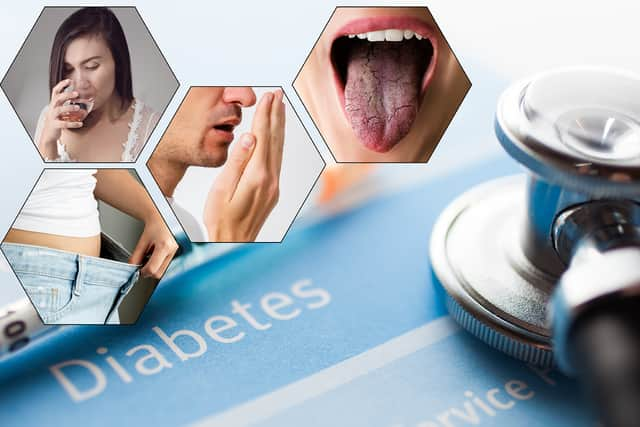Diabetes symptoms: 2 warning signs in the mouth that could indicate high blood sugar
and live on Freeview channel 276
Almost four million people in the UK have diabetes, but thousands of cases are still undiagnosed.
Figures from the Diabetes and Wellness Foundation estimates that 100,000 adults have type 2 diabetes but do not know it.
Advertisement
Hide AdAdvertisement
Hide Ad

Type 2 diabetes is far more common than Type 1, and accounts for around 90% of all adult cases in the UK.
The lifelong condition is caused by problems with the production of insulin in the body and is often linked to being overweight or inactive, or having a family history of type 2 diabetes.
It causes the level of glucose in the blood to become too high and can lead to a variety of serious health conditions, such as heart disease or a stroke.
Many people have the condition without realising as symptoms do not necessarily make you feel unwell, making the disease difficult to spot.
Advertisement
Hide AdAdvertisement
Hide AdHowever, there are a few telltale signs to look for that could be a warning sign of type 2 diabetes.
What are the symptoms?
Two common symptoms of high blood sugar - also known as hyperglycaemia - can be evident in the mouth. These include a dry mouth and a breath that smells “fruity”, according to the NHS.
Other symptoms that could be a sign of type 2 diabetes include:
- peeing more than usual, particularly at night
- feeling thirsty all the time
- feeling very tired
- losing weight without trying to
- itching around your penis or vagina, or repeatedly getting thrush
- cuts or wounds taking longer to heal
- blurred vision
Symptoms of hyperglycaemia in people with diabetes tend to develop slowly over a few days or weeks, and in some cases symptoms will not appear until blood sugar levels are very high.
Advertisement
Hide AdAdvertisement
Hide AdHyperglycaemia symptoms can also be caused by undiagnosed diabetes, so the NHS advises seeing a GP if this applies to you.
What can cause high blood sugar?
A variety of factors can trigger an increase in blood sugar level in people with diabetes. Typically this can include:
- stress
- an illness, such as a cold
- eating too much, such as snacking between meals
- a lack of exercise
- missing a dose of your diabetes medicine or taking an incorrect dose
- overtreating an episode of low blood sugar (hypoglycaemia)
- taking certain medicines, such as steroids
How is it treated?
Most people will need medicine to control their type 2 diabetes. This will help to keep blood sugar levels as normal as possible to prevent further health problems and may need to be taken for the rest of your life.
A healthy diet and keeping active can also help to manage your blood sugar levels.
Advertisement
Hide AdAdvertisement
Hide AdThe NHS recommends eating a wide range of foods, including fruit, vegetables and starchy foods like pasta, and keeping sugar, fat and salt to a minimum. Around 2.5 hours of physical activity is also advised per week.
There is evidence that eating a low-calorie diet (800 to 1,200 calories a day) on a short-term basis (around 12 weeks) can help with symptoms of type 2 diabetes, and some people have found that their symptoms go into remission.
However, a low-calorie diet is not safe or suitable for everyone with type 2 diabetes, such as those who need to take insulin, so it is important to seek medical advice before going on this type of diet.
Comment Guidelines
National World encourages reader discussion on our stories. User feedback, insights and back-and-forth exchanges add a rich layer of context to reporting. Please review our Community Guidelines before commenting.
